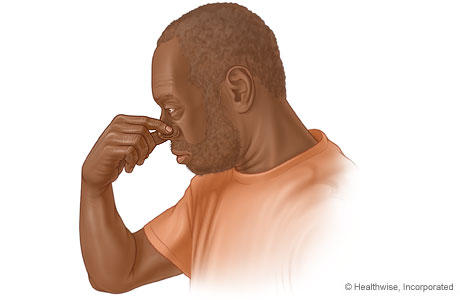How to stop a nosebleed

Follow these steps to stop a nosebleed.
- Gently blow your nose to clear any clots.
- Sit up straight and tip your head slightly forward.
Do not tilt your head back. This may cause blood to run down the back of your throat, and you may swallow it. Swallowed blood can irritate your stomach and cause vomiting. And vomiting may make the bleeding worse or cause it to start again. Spit out any blood that gathers in your mouth and throat rather than swallowing it.
- Use your thumb and forefinger to firmly pinch the soft part of your nose shut.
The nose consists of a hard, bony part and a softer part made of cartilage. Nosebleeds usually occur in the soft part of the nose.
Spraying the nose with a decongestant nasal spray like oxymetazoline (Afrin) before applying pressure may help stop a nosebleed. Be safe with medicines. Read and follow all instructions on the label.
You will have to breathe through your mouth.
- Keep pinching for at least 15 minutes.
Use a clock to time the 15 minutes. It can seem like a long time. Resist the urge to peek after a few minutes to see if your nose has stopped bleeding.
- Check to see if your nose is still bleeding after 15 minutes.
If it is, hold it for 10 to 15 more minutes. Most nosebleeds will stop after 10 to 20 minutes of direct pressure.
- Put a thin layer of a saline- or water-based nasal gel, such as NasoGel, or an antiseptic nasal cream inside your nose.
Do not blow your nose or put anything else inside your nose for several hours after the bleeding has stopped.
- Rest quietly for a few hours.
Current as of: October 27, 2024
Author: Ignite Healthwise, LLC Staff
Clinical Review Board
All Healthwise education is reviewed by a team that includes physicians, nurses, advanced practitioners, registered dieticians, and other healthcare professionals.


